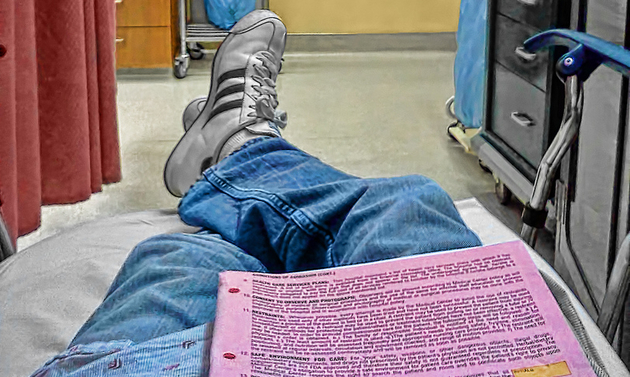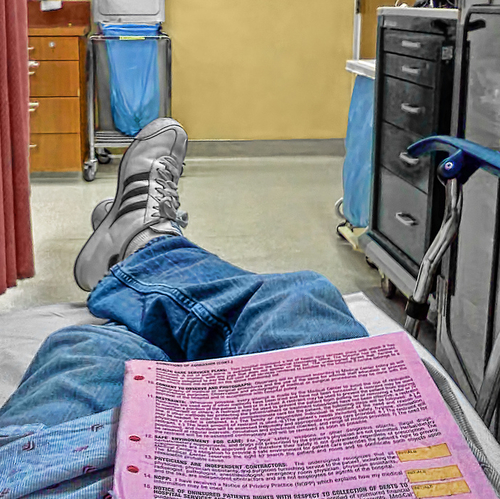Medical insurance: What snowbirds should consider
What every RVer needs to know about medical insurance before travelling south

Nearly every American I talk to while travelling has an opinion about our social health-care model. While not everyone supports the Canadian model, they certainly admire our universal health-care. If you are lucky enough to spend an extended period of the Canadian winter in the warm(er) southern tier of the United States, Mexico or somewhere else, you will need to arrange medical insurance for your time away from Canada.
This time of year, RVwest magazine gets more queries about medical insurance for extended stays outside of Canada than any other topic. We wanted to give our readers a more in-depth look at the questions and answers regarding insurance, and to discover what the insurance companies find are the top questions on the minds of snowbirds. What follows is an exploration of those questions directly with representatives from two insurance companies.
Medipac and Manulife are two companies that provide comprehensive medical insurance plans and representatives from each provided input for this article.
“The most important issue to consider when purchasing travel medical insurance is coverage for pre-existing medical conditions, and to be skeptical of prices that are too low,” said Christopher Davidge, vice-president, Medipac. He said the top five questions his team gets are:
- Am I still insured on a boat?
- Do I have to go to a specific doctor or hospital?
- Do I have to come back to Canada if I have an illness? (maybe)
- Should I buy an annual plan?
- Should I recuperate at home or where I am? (It is probably better to recuperate at home. Besides, the day after your medical issue, you are considered to have a pre-existing condition and the minimum stable period starts again.)
Chris Bradbury, vice-president, Operations, at Medipac, added that these are the follow-up questions that customers should be asking:
- What is the coverage for a pre-existing medical condition?
- What are the policy terms for repatriation?
- What are the stability periods, and the definition of stability?
- What are the costs and terms of top-ups of existing plans?
- What are the geographic limitations?
Robert Lafrate, assistant vice-president, Travel Insurance, at Manulife, provided the following information:
Top questions snowbirds should be prepared to ask an insurance company before seeking travel insurance:
- How does the policy handle pre-existing medical conditions?
- Are they covered or not?
- If yes, what are the conditions of the policy in order to have coverage for them?
- Are there any built-in deductibles to the benefits provided?
- If so, how do they apply and can I remove deductibles from coverage if I wish?
- If I have a change in my medical condition between the time of application/completion of the medical questionnaire and my departure date, what are the procedures with your company?
- If I have coverage from other sources and have a claim, how does your policy work with those other sources of coverage?
- If I have a minor medical situation early during my policy period, seek your assistance and have a claim paid, how will my policy work if I wish to stay at the destination?
- Will I be required to return home or do I have other options?
This is the information Manulife asks/requests from Canadian snowbirds who come to the company for travel insurance:
- Their age/date of birth, address and destination
- Their departure and return dates
- Is this a one-time trip this year or will they take additional trips?
- Are they only looking for emergency medical coverage? Any other needs?
- In the majority of cases the completion of a medical questionnaire is required. If interested in the quote/coverage, a form of payment is needed to secure the policy.
- Their acknowledgement that they have answered all questions on the medical questionnaire honestly and truthfully will be requested.
- Travellers will be asked to read the provided fulfilment material that completes the sale.
- Travellers need to take their policy with them during their travels and have access to their policy number and emergency assistance contact numbers. If in a medical emergency at the destination, travellers should call the emergency assistance numbers provided prior to seeking treatment or as soon as possible.
Some travellers feel they will not qualify for insurance because of a pre-existing condition. In fact, an insurance plan may be underwritten with increased premiums to offset pre-existing medical conditions or reduced stable periods. These plans are tailored to an individual.
When considering repatriation, travellers are advised to understand what is included if they need to return home. What about your spouse, your car or RV, and your pet?
What if you are in Florida and decide to add on a cruise? Check your policy with your provider; most of this will be covered unless there is a Canadian travel advisory. An insurance company may not be able to arrange access in a location where there is a travel advisory in effect. Check the latest advisories here. It is worth noting many insurance providers exclude coverage for injuries as a result of war or terrorism.
Bradbury added this advice:
- Pay careful attention to terms and definitions.
- Understand what impact particular events mean to the policy. For instance, the new health issue that pops up during the trip is a pre-existing condition the next day and will impact your stability.
- If cost is surprisingly low be skeptical and research carefully.
Anticipate the questions above, explore your options, shop carefully and compare benefits and prices. The good news is that there is likely insurance coverage that will suit your needs; if not, you can possibly arrange a customized underwritten plan. The peace of mind you get with good travel insurance just adds to the pleasure of knowing you won’t have to shovel snow, at least while you are down south.








